Publication Information
ISSN: 2641-6816
Frequency: Continuous
Format: PDF and HTML
Versions: Online (Open Access)
Year first Published: 2018
Language: English
| Journal Menu |
| Editorial Board |
| Reviewer Board |
| Articles |
| Open Access |
| Special Issue Proposals |
| Guidelines for Authors |
| Guidelines for Editors |
| Guidelines for Reviewers |
| Membership |
| Fee and Guidelines |
 |
Food Waste in Portugal – A Public Policy with the Commitment of All Society
Nuno Vieira E BRITO1*, Paula BICO2, Carlos BRANDAO1
1Center for Research and Development in Agri-food Systems and Sustainability, Polytechnic Institute de Viana do Castelo, Portugal
2General Directorate of Food and Veterinary, Lisbon, Portugal
Received Date: November 14, 2019; Accepted Date: November 22, 2019; Published Date: December 03, 2019
*Corresponding author: Nuno Vieira E BRITO, Center for Research and Development in Agri-food Systems and Sustainability, Polytechnic Institute de Viana do Castelo, Portugal. Email: nunobrito@esa.ipvc.pt
Citation: BRITO NVE, BICO P, BRANDAO C (2019) Food Waste in Portugal–a Public Policy with the Commitment of All Society. Adv Nutri and Food Sci: ANAFS-157.
Abstract
It is estimated that 30% of the world’s useful agricultural area, equivalent to 300 kilos of food lost per inhabitant and corresponding to an economic cost of 750,000 million dollars, is wasted annually. On the other hand, in Europe there is an unacceptable direct relationship between economic development and the level of food waste where 89 million tons of food end up in the trash, in a scenario shared by different developed countries outside the European Union. In this context it is important to define and maximize strategies for reducing food waste, which is a global, social, civic, economic, technological, scientific and human commitment. Any strategy to be implemented will have to include different variables. In a reflected proposal, 5 intervention axes are to be considered: to carry out studies to know how much, how, where and why of food waste; disseminate and promote good practices and awareness raising actions; analyse and review normative aspects; encourage the design and development of new technologies; collaborate with the agents and organizations involved in this field. Considering these variables, in Portugal, in the past year of 2014, through a formal commitment "Combating Food Waste, a commitment of all", a common strategy was defined for all agents of the food chain who were actively involved in an organized, structured and coordinated way, committing to change attitude, working procedures and management systems.
Keywords: Food waste; Good practices; Portugal; Strategy
Introduction
It is estimated that 30% of the world’s useful agricultural area, equivalent to 300 kilos of food lost per inhabitant and corresponding to an economic cost of 750,000 million dollars, is annually wasted. At the same time, the carbon footprint of food loss and waste (FLW) is estimated to be up to 3.49 gigatons of carbon dioxide equivalent (gtCO2e), representing up to 6–10% of total anthropogenic greenhouse gas (GHG) emissions (HLPE 2014) [1].
Food is produced for the purpose of being consumed; nevertheless, 33% of all produced food is wasted throughout the value chain, with some regions reaching 40% [2]. Those foods, that do not serve the purpose for which they are produced, constitute what is meant by "food waste", becoming a problem across the entire food chain, from production to consumption.
In addition, an unacceptable and direct relationship between economic development and the level of food waste is observed. In Europe, projections show that between 30% and 50% of edible food will be wasted every year through the whole food chain until it reaches the consumer. This equates, in the 28 member states of the European Union (EU-28), to 173 kilograms of food waste per person. Considering the total amount of food produced in EU in 2011, around 865 kg/person, this represents a waste of 20 % of the total food produced and also an annual food waste around 89 million tonnes in the EU, distributed by households (42%), industry (39%), catering (14%) and distribution (5%). These figures allow us to predict that EU food waste by 2020 will be around 126 million tonnes, which will represent almost 20% increase since 2016 [3].
Within this framework, the reduction of food waste is both particularly relevant and also a moral obligation in a world where about one-sixth of the population is hungry and where 870 million people are in a state of malnutrition.
In Portugal, considering the sum of food loss and waste that occur along the different stages of the supply chain, it was estimated that food waste represents 17% of the annual food production, approximately 1 million tonnes [4]. This scenario implies to adopt in civil society, public administration and government strategies, policies and behaviours that prevent and reduce the economic, social and environmental costs inherent to food waste. It is determinant the compromise of all stakeholders, including consumers’ and the Government, in order to commit themselves in enhancing the efficiency of the food chain, with the short-term goal of a significant reduction of food waste.
It should be present that re-using, redistributing and recycling the products is fundamental for food waste reduction, and that is positively influenced by food safety, food quality and other good practices in all stages in the food chain. This can never be neglected.
Furthermore, is absolutely urgent to reinforce and implement much more academic and scientific studies that review, analyse and provide insights into Portuguese policy approaches, as well as business and social options, to address the issues raised by food waste and its impact
The objective of the present paper is to deliver and to describe a set of policies and actions based on the commitment assumed in Portugal to reduce food waste by all partners involved in the food chain, consumers and civil society, public administration and government.
Also, in a broader sense, this analysis aims to fill gaps in scientific and academic evidence in order to increase the knowledge base on food waste behaviour. In parallel, has the objective of contributing to the establishing of a basis for the creation of a repository of knowledge that provide society and policy makers with data and guidance for the definition and development of evidence-based strategies that predictably improve the quality and effectiveness of policy measures as well as technological innovations.
Materials and Methods
In Portugal, considering the real lack of knowledge about the impact of food waste in the different sectors of the food chain and the non-existence of credible studies to support the implementation of reduction policies and strategies, it was essential the implementation of a set of targeted actions that alerted and committed the community for what was political consider a national purpose.
The different entities, organizations and associations, both public and private, that were directly related to this object were identified and grouped in:
- Government (Ministry of Economy, Ministry of Agriculture and Ministry of Health), public administration (Directorates-General and Food and Economic Security Authority) and international organizations (FAO);
- Confederation and associations of productive (agriculture),industrial (agri-food), trade (distribution) sectors, catering and consumers
- Teaching and research entities (universities and polytechnics, research institutes) and professional organizations’;
- Civil society (Food Bank against Hunger and other NGOs).
On the basis of a common understanding, the document "Food Waste - a commitment of all!” was prepared. This document aimed to obtain at a precise characterization of the national situation and, at the same time, intended to institute a national strategy to combat food waste. Specific groups and thematic areas were established, in order to define actions, develop activities and disseminate policies and results to all the different focus targets.
Results and Discussion
In Portugal, in the past year of 2014, the formal commitment: “Combating Food Waste, a commitment of all", was defined as the common strategy by all food chain agents. All stakeholders were actively involved in an organized, structured and coordinated way, assuming the importance and the will to change attitude and develop waste free procedures and management systems.
An inclusive approach was defined which required a compromise that united all partners in the adoption of a set of recommendations. This public commitment, which begins in production stage and ends in the final consumer, was based in the following common and crosscutting principles which are determinant “towards zero waste” objectives:
- Promotion of cooperation between all partners in a combination of efforts to fight food waste;
- Development of a waste reduction strategy and monitoring methodology definition;
- Awareness the society, in general, for food waste along the food chain;
- Development and disseminate best practices in the management of food losses;
- Promote the recovery of food products that are not in conditions to be consumed, as well as intermediate products and packaging material;
- Developing alternative solutions for potential food waste (re-use);
- Definition and acceptance of unconventional redistribution chains;
Any strategy to be implemented has to include different variables and domains. This planning foresees 5 intervention axes.
Primary Production and Transformation
The food supply chain begins on primary production, one of the most wasteful stages. It is estimated that the initial and final stages of the chain area the ones where almost all losses occur. To limit waste as much as possible, the following measures are listed:
- Carrying out adequate and rigorous planning of food production;
- Minimizing losses, using natural resources efficiently and sustainably;
- Limiting food waste on farms by increasing efficiency in the harvesting process;
- Adapting the installed capacity of agro-industry for the estimated production;
- Managing, handling and storing properly the agricultural products for agro-industry;
- Innovating in packaging technology, creating new food preservation solutions;
- Optimizing production capacity to commercial storage and disposal capacity;
- Promoting better information to the consumer, on the contents of the labels, giving priority to the conditions of conservation, dates of minimum durability and consumption deadline;
- Working with stakeholders, in order to establish different solutions for ingredients or intermediate products and foods that are not suitable for quality reasons but meet all legal requirements for food hygiene and food safety.
Within this axe, the articulation of the defined measures was implemented as in the structure presented in the (Figure 1) related to the management of agricultural surpluses:
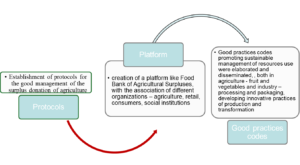
Figure 1: Primary production and transformation measures.
Logistic Distribution and Retail Market
Logistic distribution is an important link in the food chain, bringing goods closer to the population and transporting them from the origin and production zones to the places of commercialization and consumption. In the logistics and retail distribution sector, the following good practices were planned and implemented in order to reduce food waste:
- Valuing local production and domestic production;
- Defining strategies of consumption of local/national products, ensuring that Public Institutions (schools, universities, hospitals) prefer national production;
- Schedule logistics and transportation;
- Managing and storing the stocks properly: "first-in, first-out";
- Promoting the rotation of the products in the shelves, guaranteeing that products with nearer validity periods are placed ahead of the rest;
- Promoting the quick sale of products approaching the expiration date;
- Handling products properly in order to avoid packaging deterioration;
- Re-sizing of the packages in face of the needs of the households and consumption patterns;
- Promoting the sale in bulk in an appropriate manner.
The distribution sector already had an enormous concern to the problem of food waste and had already implemented a set of measures and actions towards reducing it. Good practice guides have been developed and disseminated to the distribution professionals and to the consumers, with training in specific activities and in which the concern to ensure food security is constant and a priority.
At the same time, new practices were introduced in product marketing, particularly in packaging, and food surpluses donation to charities was encouraged. Likewise, in the catering activities, actions of sensitization were promoted and started programs of collection of meals for reutilization, in an approach of support to the most deprived ones. The measurements / results of this axis are summary present in (Figure 2) below.
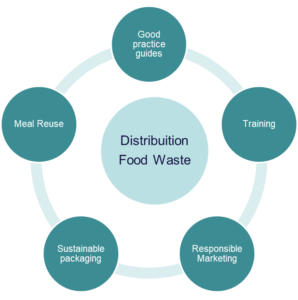
Figure 2: Logistic Distribution and Retail Market measures.
Education and Communication
The prevention of food waste is fundamental at the educational level as part of one communication strategy. Reducing food waste in the final stage (consumer) implies changing behaviours, habits and even the routines of individuals, families and all society. Sensitization and media communication are important key factors for the success of this goal.
A set of recommendations are included to contribute to the reduction of food waste: Introducing awareness in the school programs to prevent food waste;
- Application of the School Fruit Scheme in as many municipalities as possible;
- Dissemination of good domestic and purchasing practices;
- Raising awareness of the differential treatment of perishable and non-perishable products;
- Promotion of initiatives on food consumption indications and disseminating rules for good conservation practices;
- Motivation for more frequent buying in local markets;
- Encouraging the “shopping list” taking in account the size of the families;
- Promotion and encouraging the consumption of seasonal products;
- Developing culinary skills that prevent food waste and producing safe and healthy meals.
The receptivity of society and the academy to the problem of food waste was very high and very intense its mobilization. Numerous actions have been developed within the different strategic social segments that were translated in the following (Figure 3):
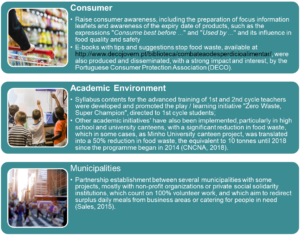
Figure 3: Education and communication measures.
Awareness and Accountability
The general commitment against food waste implies a great social awareness, including the articulation and partnership with charity institutions. In this context, a group of recommendations were settled in order to boost the reduction of food waste:
- Awareness for the adoption of responsible consumer practices;
- Creation the notion of "food footprint" to enable families to calculate their level of loss;
- Food donation programs involving food donors, redistribution organizations and recipients;
- Promotion of agreements to redirect, for food donation institutions, the primary products: fruits and vegetables and other products that do not enter in the agro-industrial sector;
- Introducing the concept of “healthy food” into all procedures related to food donation or food support for vulnerable populations;
- Helping the donors to separate food products not eligible for sale, although they meet all legal hygiene and food safety rules and requirements;
- Making easy the exchange of good practices on the prevention, redirection and use of products and surpluses.
Within this axis, one of the most significant realizations was the launch of award “PRA-TØ - Recognition of Food Waste Prevention Practices”, an initiative of the Government and Civil Society, under the high patronage of His Excellency, the President of the Republic of Portugal. The objective of this award was to distinguish the implementation of policies and models of good management in food waste reduction (Figure 4).
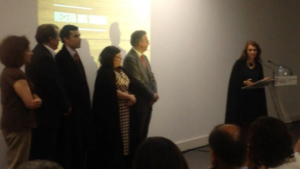
Figure 4: 2015 Award ceremony - Seal of Recognition PRA-TØ.
The first edition distinguished entities that took responsibility for the impacts of their decisions and activities, created value for stakeholders and contributed to sustainable development, involved the Portuguese business community, and society as a whole, in the area of Food Waste and Social Responsibility and to highlighted the work already done in this field by different entities. This award was a success with 37 competitors in 5 categories.
Regulation, Implementation and Recognition
The mission of the Government is to regulate when necessary in the prevention of food waste, therefore, tools and studies that, directly or indirectly, promote food waste reduction can be created, as the National Platform of Knowledge on Food Waste. Some of the administrative proposes in order to reduce and prevent food waste were:
- Monitoring the reduction of food waste and improve the food chain sustainability;
- Creation of local markets and promoting local short commercialization circuits;
- Valorisation, at the level of public contracts, companies with social responsibility and good anti-waste practices implemented;
- Evaluate the possibility of acquiring food products from production and local markets by making public procurement rules more flexible, taking into account food security;
- Evaluate the possibility of implementing a fiscal and/or economic benefit aimed at food donation;
- Advertise or distinguish the distribution agents that have, by product range, levels of national products commercialization over 2/3;
- Create a competition to identify best practices in the "Prevention of Food Waste" throughout all phases of the process;
- Advertise good practices related food waste prevention with a "seal" that can be identified and valued by the consumers and stakeholders.
The evaluation and segmentation study of food waste in Portugal, with suggestion of proposals and lines of future action, was presented with its first conclusions. This information allowed decision makers and stakeholders to gain a more detailed knowledge of the reality, thus defining lines of action for their prevention, bringing the waste of reuse closer. Another result within this axis was the decree-law published on production local markets.
More recently, following the strategy initiated in 2014 and emphasizing that the fight against waste do not stop with the change of political cycles, the National Commission to Combat Food Waste was instituted [5], which resumed the National Strategy to Combat Food Waste.
Last, Portugal was a pioneer in the development and elaboration of Codes of Good Practices that facilitate food donation. These guiding documents are currently undergoing review and adaptation, and these adjustments stemmed from the experience gained by donors and recipients (Food Bank, Re-food, among others), during the implementation of the policies defined in the National Strategy.
Conclusions
The strategy started in 2014 to trigger a more effective and articulated fight against food waste had the capacity to promote the discussion on the subject and served to place at the same table and with the same objective all stakeholders in the agri-food sector.
As an example, it is important to highlight that the aggregating strategy defined in 2014 by civil society, the public sector, the municipalities and NGOs currently has significant results. Observing the 2018 data of the Zero Waste Movement, the measures and attitudes implemented allowed the results presented in (Figure 5), reveals:
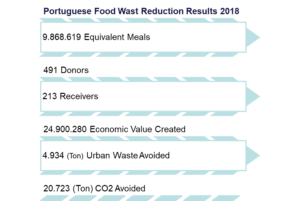
Figure 5: Portuguese Food Waste Reduction Results 2018 – Zero Waste Movement indicators [6].
Also, it is relevant to notice the Re-food evolution. This NGO, which aims to prevent food waste and distributing leftover meals from canteens, restaurants and caterings to needy people in 5 years achieved to the results present in (Figure 6).
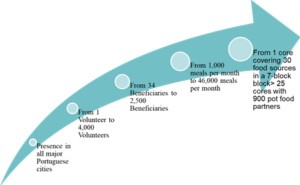
Figure 6: Re-Food ONG 5 years results 2014-2019 [7].
Since then, all the strategy measures were aligned to the sustainable goals defined in the 2030 Agenda. Portugal and the Portuguese food sector undertake the 2030 Agenda, as a commitment to eradicate poverty and achieve sustainable development by 2030 worldwide, ensuring that no one is left behind.
The 17 Sustainable Development Goals (SDGs) and their 169 associated targets are global in nature, universally applicable and interlinked with the 2014 food waste reduction national agenda. All countries, developed and developing, have a shared responsibility to achieve the SDGs, integrating, in a balanced manner, the three dimensions of sustainable development - economic, social and environmental - and reflects for the first time an international consensus that peace, security, justice for all, and social inclusion are not only to be pursued on their own but that they reinforce each other [8-11].
Portugal, as a project based on fundamental values and fairness, embraces the UN 2030 Agenda for Sustainable Development as a unique opportunity for a better future, also in food waste and food access matters. To preserve the future, the right policy choices have to be made today with a strong commitment between all the stakeholders.
References
- Gromko D, Abdurasulova G (2019) Climate change mitigation and food loss and waste reduction: Exploring the business case, CGIAR, 2019-03-05.
- FAO (2019) Food Loss and Food Waste, http://www.fao.org/food-loss-and-food-waste/en/
- Stenmarck A, Jensen C, Quested T, Moates G (2016) Estimates of European food waste levels. FUSIONS reducing food waste through social innovation. European Commission (FP7), Coordination and Support Action – CSA. ISBN 978-91-88319-01-2
- Baptista P, Campos I, Pires I, Vaz SG (2012) From the Field to the Fork, Food Waste in Portugal, Lisbon: CESTRAS - ISBN 978-989-20-3438-6.
- DR 2016. Republic Diary. Dispach n.º 14202-B/2016, 2.nd series, n.º 227, de 25 of November.
- Zero Waste Movement, 2018, Zero Waste, what have we achived, http://www.zerodesperdicio.pt/
- Re-Food, 2019, Re-Food 5 years results, https://www.re-food.org/en/evolucao
- UN (2015) Transforming our world: the 2030 Agenda for Sustainable Development, United Nations, October 2015.
- CNCDA (2018) Initiatives to Combat Food Waste, Food Waste Combat National Commission, PT: http://www.cncda.gov.pt/images/iniciativas_nacionais/Nlayout_Ficha_Iniciativas NCDA_SASUM.pdf.
- EU (2016) Next steps for a sustainable European future - European action for sustainability, Communication from the Commission to the European Parliament, the Council, the European Economic and Social Committee and the Committee of the Regions, Strasbourg, November 2016.
- Moldão J, Bico M, Mira P, Martins L, Mourato M., et al. (2015) Food Waste Reduction, A Challenge within our reach, Calouste Gulbenkian Foundation, ISBN 978-972-8669-61-4 / 978-972-8669-61-1.